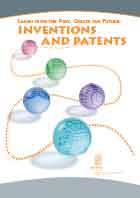Learn from the Past, Create the Future: Inventions and Patents
Publication year: 2010

“Inventions and Patents” is the first of WIPO’s Learn from the past, create the future series of publications aimed at young students. This series was launched in recognition of the importance of children and young adults as the creators of our future. Combining fun with facts, and packed with illustrations, the publication takes young readers on a journey through the world of inventions and patents. Simple explanations of how patents work, why we need them, and how they contribute to scientific and technological progress, are interspersed with the stories behind successful inventions. Inventor Profiles are drawn from around the world, and teachers are encouraged to supplement these by getting their students to research inventions from their home country.
Teaching IP theory through practice
Geared towards students from 9 to 14 years’ old, the publication is in the form of a workbook, which can be photocopied for classroom use. It teaches theory through practice, and IP concepts through case studies. To play the PCT Detective game, for example, students learn to search patent applications in WIPO's online PCT database.
Much of the material can be integrated into science classes. Teachers can build on the information provided by discussing with students the scientific principles behind some of the featured inventions, such as the combination of concave and convex lenses in the telescope, or the laws of thermodynamics in the Nigerian "pot-in-pot" cooling system.
Inventions and Patents debunks the stereotypes of inventors, and encourages students to recognize in themselves the essential qualities of curiosity, creativity and perseverance which enable individuals to invent. It concludes with a roadmap for inventing, taking students through the whole innovation process from idea to IP protection to commercialization.